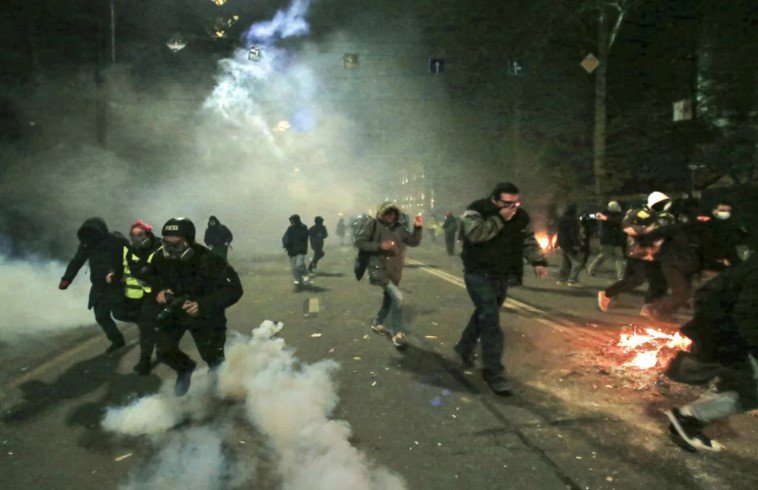A wave of protests in Georgia has led to over 400 arrests, with demonstrators clashing with police nightly. Allegations of police violence and masked vigilantes attacking opposition figures add to the turmoil as the government defends its controversial policy shift.
Arrests and Anguish: Families Bear the Brunt
Seventy-five-year-old Marina Terishvili’s story is just one of many that encapsulate the emotional toll of Georgia’s current unrest. Her son, Giorgi, a 52-year-old taxi driver, was arrested last Friday for “participating in group violence,” leaving the family devastated.
Authorities allege Giorgi was involved in attempts to overthrow the government. If convicted, he faces up to six years in prison. Marina’s grief is compounded by memories of her younger son, Mamuka, who was killed in a nationalist rally in 1992. For her, the protests are deeply personal—a fight against a perceived betrayal of the sacrifices made decades ago.

Human rights groups argue that these arrests signal an unprecedented crackdown. Many detainees are accused of actions as severe as plotting violence, but their supporters see them as individuals standing against government decisions they view as undermining Georgia’s future.
Protest Dynamics: Violence on Both Sides
The demonstrations have been marked by nightly clashes. Protesters argue they are defending themselves against excessive police force, while authorities accuse them of resorting to violence.
- Fireworks and projectiles have been thrown at law enforcement.
- The interior ministry reported injuries to over 150 police officers.
- Tear gas and batons remain routine crowd-control tools used by the police.
Despite this chaos, protesters persist, angered by the Georgian Dream party’s decision to pause EU accession talks until 2028. This policy, they say, jeopardizes the country’s European aspirations and panders to Russian influence.
Western Condemnation and Local Denials
The international community has not stayed silent. Western governments and the European Union have expressed alarm at the suppression of protests and the violence against demonstrators. The EU ambassador has even suggested sanctions as a potential response.
On the ground, stories of mistreatment abound. Georgia’s ombudsman reported that 225 out of 327 detainees claimed abuse, with 157 showing visible injuries. Opposition groups accuse the government of planting evidence, such as fireworks and petrol bomb materials, to discredit their cause.
Prime Minister Irakli Kobakhidze dismissed these claims, labeling opposition party offices as “hotbeds of violence” and accusing them of attempting an illegal power grab.
The Shadowy Role of Masked Vigilantes
Adding to the unrest, masked men dressed in black have targeted opposition members, activists, and journalists. These gangs, referred to as “titushky,” mirror tactics used in Ukraine during its 2014 uprising.
Recent incidents include:
- Two journalists from an opposition-aligned channel sustaining head injuries in a Dec. 7 attack.
- Koba Khabazi, a Coalition for Change politician, being severely beaten inside his party headquarters by 15 masked attackers.
Surveillance footage captured the brutal assault on Khabazi, sparking outrage. The government has denied involvement, with officials suggesting the opposition staged the attacks to discredit the ruling party.
Looking Ahead: Political Turmoil Deepens
Georgia’s political crisis highlights a growing divide within the nation. On one side are citizens pushing for European integration and democracy; on the other, a government advocating a cautious approach amidst regional tensions.
As nightly protests continue and international pressure mounts, Georgia faces a critical juncture. How it handles these turbulent times could shape its path for years to come.
